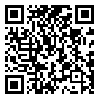Volume 14, Issue 1 (volume14, Issue 1(COVID-19 and Mental health) 2020)
2020, 14(1): 87-101 |
Back to browse issues page
Download citation:
BibTeX | RIS | EndNote | Medlars | ProCite | Reference Manager | RefWorks
Send citation to:



BibTeX | RIS | EndNote | Medlars | ProCite | Reference Manager | RefWorks
Send citation to:
Hatami Varzaneh A, fathi E, Khanipour H, Habibi N. Predicting Helping Attitude based on Attachment styles, Empathy, and Self-compassion among Volunteer and non-Volunteer Groups in Public Participation during COVID-19 Outbreak. Research in psychological health 2020; 14 (1) :87-101
URL: http://rph.khu.ac.ir/article-1-3755-en.html
URL: http://rph.khu.ac.ir/article-1-3755-en.html
1- Hazrat-e Masoumeh University
2- Hazrat-e Masoumeh University ,fathielham@ymai.com
3- Kharazmi University, Tehran, Iran
4- University of Mohaghegh Ardabili, Ardabil, Iran
2- Hazrat-e Masoumeh University ,
3- Kharazmi University, Tehran, Iran
4- University of Mohaghegh Ardabili, Ardabil, Iran
Abstract: (8585 Views)
| With the outbreak of COVID-19 pandemic disease and the social and economic consequences of this pandemic, volunteering and helping activities especially for needy people and the society in crisis developed. The aim of this study was to explore the role of attachment styles, empathy and self-compassion in predicting attitude toward helping during Covid-19 Outbreak in Iranian society. The present study conducted in April and May 2020 in Iran. The study sample (n=348) selected by convenient sampling method. Instruments of this study were the adult attachment scale, self-compassion scale, basic empathy scale, and helping attitude scale. Findings showed that participation of women; employed ones and the 25-35 year old age group were more than men, unemployed ones and other age group. There was significant difference between volunteer and non-volunteer groups in helping attitude, self-judgment, isolation, mindfulness, over-identification and secure attachment style. Correlation coefficients indicated that self-kindness; common humanity, isolation, mindfulness, cognitive empathy and secure attachment had positive significant correlation with helping attitude. In addition, anxious attachment negatively associated with helping attitude. Regression analysis indicated that cognitive empathy, emotional empathy, secure attachment style and mindfulness predicted helping attitude. It can conclude that volunteers for community services during COVID-19 outbreak had positive attitude toward helping and had more secure attachment styles and higher level of self-compassion in comparison to non-volunteers. It seems having strong empathy, secure attachment style and being mindful, are psychological prerequisites for having positive volunteering and helping attitudes. |
Type of Study: Research |
Subject:
General
Received: 2020/05/29 | Accepted: 2020/06/20 | Published: 2020/06/26
Received: 2020/05/29 | Accepted: 2020/06/20 | Published: 2020/06/26
Send email to the article author
| Rights and permissions | |
 | This work is licensed under a Creative Commons Attribution-NonCommercial 4.0 International License. |






